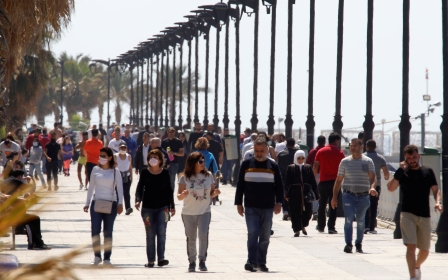Lebanon at risk of major food crisis, warns prime minister

Lebanon is at risk of a major food crisis and many people may soon find it hard to afford bread because of an acute financial crunch and the fall-out from the coronavirus, the country's prime minister has warned.
"Once the breadbasket of the Eastern Mediterranean, Lebanon is facing a dramatic challenge that seemed unimaginable a decade ago: the risk of a major food crisis," Hassan Diab wrote in the Washington Post on Wednesday.
New MEE newsletter: Jerusalem Dispatch
Sign up to get the latest insights and analysis on Israel-Palestine, alongside Turkey Unpacked and other MEE newsletters
"A few weeks ago, Lebanon witnessed its first 'hunger protests.' Many Lebanese have already stopped buying meat, fruits and vegetables, and may soon find it difficult to afford even bread."
Lebanon was in deep crisis even before the coronavirus pandemic. The local currency has more than halved in value since October amid a hard currency liquidity shortage.
Inflation and unemployment are soaring. Lebanon defaulted on its sovereign debt in March.
Imported food prices had more than doubled since the start of 2020, Diab said. More than half of Lebanon's food is imported.
Central bank intervention
In a televised speech on Thursday, Diab said Lebanon's central bank will begin intervening in the market to protect the Lebanese pound, whose declining value forced up the price of food and other commodities.
"I received a promise from the governor... that the bank will intervene in the market, starting from today, to protect the Lebanese pound and to rein in the rise of the dollar exchange rate," Diab said.
He also said importing basic foodstuffs would be supported and prices monitored so that people would soon see a decline in costs.
In a statement, the central bank said it would start providing dollars for food imports as part of "necessary measures" to defend the pound.
The bank said its new measures would start next week and commercial banks could take part.
'Starvation may spark a new migration flow'
In his Washington Post article, Diab also warned of a global food security emergency triggered by the coronavirus pandemic.
The prime minister said attempts to restrict food exports must be resisted and called on the United States and the European Union to set up an emergency fund to help the Middle East avoid a severe crisis.
Otherwise, "starvation may spark a new migration flow to Europe and further destabilize the region", he wrote in the US newspaper.
Diab, who took office this year with backing from Hezbollah and its allies, also blamed decades of political mismanagement and corruption for a lack of investment in agriculture.
Covid-19 and lockdowns had "dramatically worsened the economic crisis and profoundly disrupted the food supply chain," he wrote.
Eighty percent of Lebanon's wheat had been coming from Ukraine and Russia, but last month, Russia suspended wheat exports, while Ukraine is considering a similar move, Diab said.
Middle East Eye delivers independent and unrivalled coverage and analysis of the Middle East, North Africa and beyond. To learn more about republishing this content and the associated fees, please fill out this form. More about MEE can be found here.






